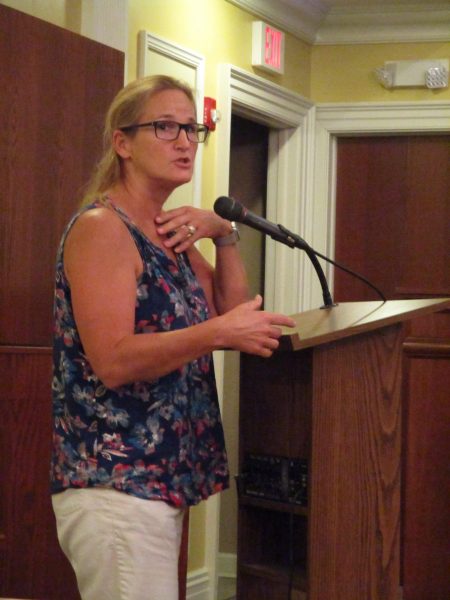To Kill or Keep? Geese Debated in Southeast

Large images of geese excrement flashed on a screen for the duration of Thursday night’s Southeast town board work session as residents fought each other about what to do with the burgeoning geese population and their insurmountable droppings.
The contentious meeting was attended by more than 45 people, many of who were eager to air their feelings and see if the town had a viable plan going forward. For well over an hour animal protection rights advocates were pitted against those favoring shooting the waterfowl to remedy the situation.
Southeast Supervisor Tony Hay reviewed the town’s practice of dealing with the geese for the last decade. He cited the town’s legal permit from the New York Department of Environmental Conservation (DEC) that authorizes the killing of geese should they pose a public health threat to waterways, drinking water supplies or swimming areas that were regularly tested for bacteria. The DEC permit gives municipalities the right to take any number of Canadian geese between April 1 and August 31 and for Canadian geese eggs can be taken, or addled, between March 1 and June 30.
“The first year I was in office, there were numerous complaints about sanitary conditions from geese droppings in our parks and ball fields,” said Hay. “We tried cut-out dogs and that didn’t work, then we used screamer guns and that didn’t work.”
Hay read a litany of facts about Canadian geese, their habitat, life span, number of yearly offspring and how many tons of feces geese deposit in their lifetime.
“The feces contain bacteria that includes E coli and salmonella to name just a few,” Hay said, as a slide showed the size of a clump of goose feces compared a quarter.
The controversy spiked recently when geese on Lake Tonetta were shot and killed, alarming lake residents who were unaware the geese were being hunted down. When goose carcasses were brought to the Wolf Conservation Center in South Salem for consumption, concerns arose about the toxicity of the bullets used, though said there was misinformation about the type of bullets used.
On the screen were pictures of local ball fields and parks covered with droppings.
“Kids in sports programs use these fields and their parents were livid about the conditions having to do with geese droppings. There’s only so much this town can do and we do everything we can. The only place we can hunt is on Lake Tonetta,” said Hay.
Maria Lagana, a veterinarian and resident of Lake Tonetta as well as the president of the Lake Tonetta Park Association said she represented those who were concerned with the wellbeing and care of wild life.
“Studies have shown that shooting the geese is not an effective way of keeping them off the lake because it opens up spots for more geese populations,” Lagana said. “Season long deterrents include having less grassy shore lines, also the addling of eggs are more effective. Shooting geese is brutal and inhumane.”
Lagana said lake residents had witnessed geese being wounded and dragged away, believing the job done was not professional.
One lake resident who saw geese being shot was Samantha Woodgate.
“I saw the gun powder coming out of the guns, the geese floundering around and it felt unsafe to have guns out in the open,” Woodgate said. “There is nothing to stop the gun fire from flying. It’s scary. Neighbors were wondering why there were guns are going off. If guns are being shot, we should know about it. Watching innocent geese being shot is heart breaking.”
Karl Lebitsch, a member of the Lake Tonetta Advisory Committee defended the use of guns to rid the area of geese.
“It wasn’t done inhumanely, the geese didn’t suffer,” he said. “Everyone can say what they want, then they put it on the internet and it blows up and that’s what’s happening right now. I urge everyone to get involved with the Tonetta Lake Advisory Committee.”
Bill Ratajack, Chairman of the Board of the Lake Tonetta Heights Community Association, said he was also upset by derogatory comments [about shooting geese] made by certain neighbors.
“We undertook this process because not much else was happening. I personally help clean the beach every day,” he said.
Bill Macgregor, Vice President of the Tonetta Lake Association supported the use of guns. “I’m the one out there controlling it. I pick the day and time and the people. People I trust are behind my back with a shotgun. I keep it safe and that’s my main concern.”
Southeast resident Ann Fanizzi offered an historical perspective of man’s battle with nature, referring to newspaper articles on past inhumane treatment of dogs by euthanizing them because their feces were considered a health risk. She did not want to see the geese killed off.
Town of Southeast Recreation Leader Cathy Chiudina, who oversees the summer swimming program at Tonetta Lake, said she filled two grocery bags with goose droppings every day.
“We have 160 kids in our swimming program and to have children running around the beach and in the grass, then fall down and have that on their hands and not taking the time to wash their hands, that’s a big safety concern for me,” said Chiudina.
Councilman John Lord said the town board will have a meeting in October and he invited residents to become involved.
“We’d like to work on a plan to implement by springtime,” he said. “Everyone will know what we are planning.”

Abby is a local journalist who has reported on breaking news for more than 20 years. She currently covers community issues in The Examiner as a full-time reporter and has written for the paper since its inception in 2007. Read more from Abby’s editor-author bio here. Read Abbys’s archived work here: https://www.theexaminernews.com/author/ab-lub2019/
